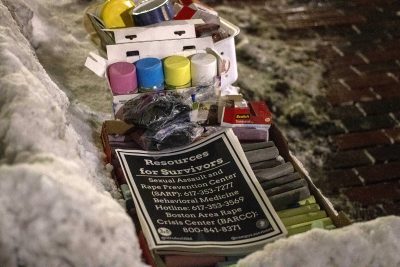
The College of Arts and Sciences Student Government hosted a virtual town hall to address sexual assault and harassment concerns at Boston University Tuesday night.
The town hall was a response to the Feb. 7 sexual assault protest organized by Campus Survivors.
Protesters wrote chalk messages around campus and put up posters with phrases such as “Our University Has a Rape Problem” to raise awareness of the issue of sexual assualt that many students say has been ignored by the University.
The town hall was aimed at providing students and survivors a platform to discuss their opinions and ideas on the community’s next steps.
Campus Survivors co-founder Prisha Kumar, a junior in the Sargent College of Health and Rehabilitation Sciences, said the event would give organizers the ability to form action steps.
“I think the town hall will give us a chance to see how to proceed with organizing more thoughtfully in the future,” she said.
CAS StuGov Executive Vice President Evan Teplensky, a sophomore and an organizer of the event alongside Kumar, said Tuesday’s town hall consisted of three discussion questions and an open forum when students could speak about issues they feel are ignored.
“What do you think is not being heard?” Teplensky said. “What do you want us to know? Because we do have a meeting set up with the administration to hopefully resolve and come up with solutions.”
The discussion questions focused on creating a “thoughtful conversation” around how to improve the sexual assault and sexual harassment issues on campus instead of creating one that revolved around shared trauma, he said.
“We don’t want it to just be trauma bonding,” Teplensky said. “Because that’s not helpful, that’s not productive and it takes a toll on everyone there.”
The first discussion question focused on how to improve campus resources for sexual assault and sexual harassment surviors in light of the nearly 200 accounts shared with Campus Survivors.
Teplensky said BU’s Sexual Assault Response and Prevention Center was brought up multiple times during the discussion as an important asset for survivors, and the CAS StuGov hopes to provide more resources to the organization.
Attendees also talked about the possibility of a sexual assault course that is a requirement for graduation.
“I think that would be a great way to hopefully decrease the amount of sexual harassment, sexual assault, catcalling that does go on around our campus,” Teplensky said.
Thereafter, the discussion moved on to the five demands put forth by protesters and the types of improvements they hope those demands will make.
On that list is a public statement made by BU administration, a zero-tolerance policy for both student organizations and faculty, an anonymous reporting system and expanded SARP resources.
Teplensky said the second question focused on how fraternities and club sports can be held accountable, as well as whether faculty should take sexual assault prevention training when students do.
“It’s just a course making sure that everyone is aware of what needs to be taught,” Teplensky said, “and what should continuously be taught so people know what to look out for, and intervene, not be a bystander.”
Before the open forum, the conversation shifted to the survivors themselves and how to ensure their mental health and well-being is prioritised, he said.
“We wanted to ask about the prior protests, and if anything was triggering, how in the future can we help to make sure that it is not triggering, and it is really impact over intent?” Teplensky said. “Really making sure that we’re addressing the administration and the problems currently at BU, not re-triggering individuals through past trauma.”
Teplensky said the BU administration was invited to the town hall to give more students a voice in the conversation, but they declined to attend.
“We really want this to be anyone who wants their voice heard to really be heard,” Teplensky said.
Currently, Kumar added, additional actions in addressing these problems are “up in the air.”
“We’re trying to use the feedback from this one to really formulate more tangible action steps,” Kumar said.
She added they want to focus on bringing students virtually into the conversation more after receiving feedback about their exclusion from the last protest.
“I feel like they should also be able to have their voice heard,” Kumar said, “so I think that we’re going to try to see if there’s ways to implement that, either through Zoom protests or some other tangible form of protesting.”
However, Kumar said decisions will not be made on future events until all possible voices are taken into account.
“Nothing’s really concrete until we hear back from as many students as possible,” Kumar said.
Teplensky said it was a “great” discussion and everyone was able to speak freely and express their concerns.
“It is a very difficult conversation to have,” he said, “but still people felt like they were open and allowed to express what they wanted, whether that be via the chat box, whether that be by private [direct messages] or out loud, it was really, really great to see so much support.”
The Daily Free Press did not attend the town hall or use any comments provided by participants. All information was provided by organizers.






















































































































